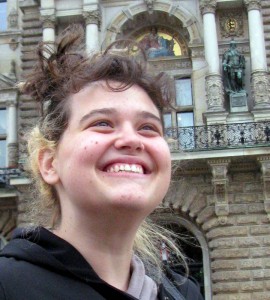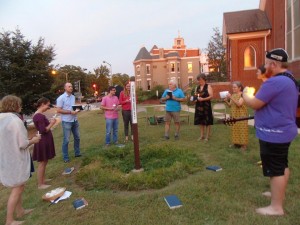
Marie Schuster
By Marie Schuster
BVS volunteer Marie Schuster lives and works at the Brot und Rosen (Bread and Roses) Community in Hamburg, Germany, a house of hospitality for homeless refugees. She describes one of her days:
My alarm goes off: once, twice, three times und Aufstehen! Since days at my last BVS project at the L’Arche community in Tecklenburg, I very much enjoy living “above the shop” and getting the most out of every second I am in bed in the morning. I throw on some clothes just in time for the bell…yeah there’s a bell. A single ring indicates the beginning of our Andacht (morning prayer). Those who feel called, file downstairs to our basement chapel. We sing, pray, and reflect together.
After a quick breakfast I set out for Cafe Exil where I will meet up with other faithful vigilers to demonstrate outside of the immigration office across the street from the cafe. Today I have extra cargo: my backpack is full of medicine and bandages to drop off at Caritas’ medical center for homeless folks. (There is a good exchange between the “MediBüro” and this center. We both receive different donations and have different needs, but with the same goal: health care for the marginalized.) I also have two banners rolled up under my arm. We had taken them home from the Cafe last Thursday to use in our Good Friday Stations of the Cross for the rights of refugees procession. They have slogans painted on them saying “No One is Illegal” and “Stop Deportations.”
It’s about a half hour trip from my home in Barmbek to the central station and then a 7 minute walk to Cafe Exil. Cafe Exil is a free and independent counseling/advice center for refugees and migrants. We connect people to organizations or lawyers that can help their case, make phone calls, or accompany them to appointments at the job center or immigration office. We are also known as a warm place with free coffee and tea so we have some “regulars” (generally non-German, homeless folks who need a place to rest for a few hours) during the colder months.
I get there around 9:45 and greet the other volunteers in the Cafe. The other men who do the vigil join me and we fold pamphlets that we will pass out as part of our demonstration. Peter arrives and we all set out to hold our banners on the darkest corner in Hamburg. This isn’t an exaggeration. The corner outside the immigration office is always in the shadows. It blocks the sun that rises behind it and the buildings across the street block it as it goes down. I find it very symbolic. On top of that it is located on a very busy, wide street that leads to the harbor which brings the wind.
Towards the end our hour-long vigil, a security guard from the immigration office comes out asking us for help / advice. There is an English speaking woman who has to go to the “Sportallee” place to apply for asylum. She is very pregnant and won’t be able to handle the stress of the complicated journey to get there. (S-Bahn, U-Bahn, bus, etc)
Peter asks what we should do. He feels it is the job of the office to look after people when they clearly cannot go on their own, as is the case here…and the case of a blind woman two weeks before. She requires a taxi, but who will/should pay? No real solution is reached and we end the vigil with the song: “You Can’t Kill the Spirit.”
Back at the Cafe I say hello to a few “regulars” and put on my jacket. I want to drop off the Meds, get lunch, and walk to MediBüro – it’s a beautiful day. Well it wasn’t in the stars. Thursdays generally do not go according to plan. A kind stranger had walked the very pregnant woman over from the immigration office. I didn’t see them come in but I saw her sitting alone on the couch. I figured it must have been the woman the security guard asked us about. I offered her something to drink. She refused. She handed me the paper the office gave her with a crude map and description of how to get to Sportallee with public transport. “I want Asyl,” she said, “I need to go here.”
Sportallee isn’t for everyone. Applying for asylum isn’t for everyone. If you don’t have a good enough (in the eyes of the state) case, you can be rejected and then be refused any future application. There are ways around it, but one has to know beforehand what they are doing, why, and how. Not easy for most people who find themselves wanting asylum. They don’t often find out until it’s too late the “could’ve, should’ve would’ves” of the situation. And they can’t be blamed either. The system is intentionally confusing and difficult so as to discourage applicants. It’s unbelievably frustrating to me and I am not even in this situation.
I discuss options with Peter. It seems this woman is mostly concerned with where she is going to sleep tonight and not what applying for asylum means. We do our best to gently ask her about the baby’s father. If he’s German she will have an easy time getting assistance. He’s not. She keeps saying she is tired and wants to go to the Sportallee. Peter made some phone calls to different shelters to see if they could take her in for a few nights before she decides what to do. He can’t find anything. He calls around for more advice. In the mean time other guests come into the cafe and I fall into my familiar role. A man comes in wanting to fill out an apartment application. Someone needs directions to another counseling center.
Peter had successfully heard from the head boss-lady at “Flucht Punkt” that we should take her to Sportallee, not to apply for asylum but for official permission to stay for humanitarian reasons. German law forbids the deportation of a pregnant woman 6 weeks before and after the birth of the child. So at least for this time she is safe and will be cared for. What happens afterwards needs to be discussed with a lawyer. She comes from a country in Africa that the state has determined is “safe” to deport folks back too. This complicates her asylum claim. We were advised to go to Sportallee, get her settled, not to discuss her country of origin, and make sure she comes to “Flucht Punkt” on Wednesday. I called a taxi while Peter looked up directions from Sportallee to “Flucht Punkt” so she would not miss her appointment.
I accompanied the woman. The ride was maybe 20 minutes long. Most of that we sat in silence I could see she was exhausted. I went over the procedure with her one more time. That we were not going to give them too much information until she had her appointment. I assured her they wouldn’t send her away so close to the due date of her baby. I said it will be fine. As soon as I said this I felt guilty. I don’t know if it will be fine. Times like this I wish I was less American-optimist and more German-realist.
It was my first time going to Sportallee. One of the guys I live with previously lived here for around 3 months. He said it was awful. It’s located in what looks like a pretty normal German, residential neighborhood. There are kids everywhere sucking on juice boxes and playing, shouting in different languages. We walk slowly from the cab (which let us out around the corner) to the main entrance. The woman I am with does not have much. A purse, a shoulder bag which is just a bigger purse, and a plastic shopping bag. I can see sandals and toiletries sticking out of it. I hold her hand as we walk up the few steps to the door. There are about five men in blue sweater vests, ties, and black pants. They are smoking and joking around with some kids. These are the security guards. They ask how they can help.
We speak in German, the woman stands patiently next to me. She doesn’t say anything; she doesn’t seem to be fully present. She is just letting everything wash over her. I tell them she is pregnant and wanting to apply for a permit to stay for humanitarian reasons. I had rehearsed this in my head on the way over. I wanted to be sure that I wouldn’t accidentally say “asylum.” The biggest guard said, “Not today.” I was confused, flustered, and angry; a full range of emotions in the half second it took for him to finish his sentence. “The office is closed, she can apply tomorrow.” They informed me she could stay the night and would get a food card and things would move forward in the morning. Then came the next question: “Where is she from?” I tried to change the subject. I said, she’s three weeks before her due date, tired, and cannot handle any more stress today. They had done this before and were not distracted. I am only talking to two men now. The younger one is smoking and asks more aggressively “Where is she from?” I hate him for smoking so close to this woman. I hate that he’s looking at me accusingly. I am scared and don’t know what to do. The other guard levels with me: “Look we can’t take her in if we don’t know where she’s from. We are not the office, but we have to know.” I level back and tell him I was advised not to disclose that until she has spoken to a lawyer.
I translate these goings on to the woman standing next to me. I realize in this moment I still don’t know her name. There is a bench and I walk her over to it. I try calling Peter for advice, he doesn’t answer his cell. I discuss it with the kinder guard a bit more and with the woman I am with and we agree to fill out the tiny form, including giving her country of origin. He tells me we want the same things for the folks here and I find myself trusting him. After a bit of a wait, they find her a key and bedding. She will not be in a normal room. She is in a container. There are about 10 containers stacked in two rows, two stories outside of the main building. They aren’t shipping containers, but more like the movable offices you see at construction sites. She’s on the second “floor.” An older guard with a gray beard shows us the way. The stairs are difficult and we go slowly together. In her room are two bunk-beds, a table, a few lockers and a single chair. There is only one other woman in this room. They do not speak the same language. She uses the toilets across the hall and I learn from the guard where the canteen is and at what time dinner is served. We settle her on the bottom bunk and I make up the bed for her. She still hasn’t said too much. She is hungry and tired. We’ve missed lunch time. I only have an apple and a banana with me. It’s hers. I help her put her things in an empty locker but put the flyer for “Flucht Punkt” on the table. I write out the German term for the permit she needs to apply for so the next day she can point to it during her interview. I also write down my cell number in case there are any problems. I hug her; remind her of her appointment on Wednesday, and leave. It feels very surreal.
I head to the bus stop and on the way call Hans who I would be working with in the MediBüro to tell him I may be late today. I also call a friend I meet through Cafe Exil. He’s a “regular” there and has been sick for over a week. I told him to go to MediBüro on Monday but he was applying for jobs and never came in. I told him I would be there today and he should come by. “Maybe.”
I change trains, get on a bus and arrive fifteen minutes before Hans. The MediBüro has just opened but there are already ten or more patients waiting in the hall. Already when I arrived, two other folks had opened the one classroom and were calling doctors. I collected some materials and began setting up the second room for when Hans would arrive. While I was waiting, I put out extra chairs in the hall for the patients. I had five minutes or so to have a cup of tea and listen to some Bob Dylan to calm down and help me transition my new roll. Its 15:30 and I have miles to go before I sleep.
What I like about working in the MediBüro is that it’s not as hectic as Cafe Exil. You get to sit down one on one (or two on one) with people and you are generally able to find a solution. They are sick, you find them the right doctor. It is relaxed and they leave happy (not always the case at the Cafe). I do a lot of the writing for Hans since his hands aren’t as steady as they once were. We only deal with the patient’s first name in order to protect their anonymity. We make an appointment, write out a letter, stamp it from MediBüro, and give them directions on how best to get there.
Even if MediBüro goes longer than expected, I leave feeling pretty good, not frazzled as is often the case when I leave the Cafe. Today we are done on time, 17:30. I am really famished and the sun is shining. I decide to walk through St. Pauli to the Caritas center to drop off the medicine and bandages that are bulging out of my back pack. There are plenty of Cafes and food stands along the way and the Drop-In Center is open 24 hours, so I don’t have to rush.
I arrived at the Caritas Drop-in around 18:30. The guy there was friendly, thanked me and I headed on towards the harbor. I sat there, taking in the sights, sounds and smells of the ships, tourists, and Fischbrötchen. The sun was still out and I tried to soak up all the vitamin D I could. It was nice to be by myself, watching the crowds. But then I had enough and got on the train to go home.
The trip from Landungsbrücke to the Brot und Rosen door is about 45 minutes if the buses line up nicely. I was pretty exhausted when I got home but was happy to find group of folks in the living room watching TV. It was nice to unwind and laugh with three of my house mates before going to bed. It was a full, stressful, but ultimately good day.
Read more about Brot und Rosen
 On September 21st, brothers and sisters gathered all around the world for International Peace Day. At the Washington City Church of the Brethren, a small community gathered around the peace pole in prayer. Josh Ammons delivered this reflection.
On September 21st, brothers and sisters gathered all around the world for International Peace Day. At the Washington City Church of the Brethren, a small community gathered around the peace pole in prayer. Josh Ammons delivered this reflection. 




